Chicken Meat: Fueling Your Body the Lean and Clean Way
Published: May 15, 2025 at 1:14:34 PM UTC
Last updated: December 25, 2025 at 11:31:43 AM UTC
Chicken meat is a key part of the American diet, known for its health benefits and nutrients. It's a great source of protein, which is vital for our health. Chicken offers more than just taste; it's essential for a balanced diet. In this article, we'll look at the benefits of eating chicken. We'll see how it helps with nutrition and overall health. Learn how adding chicken to your meals can make you healthier.
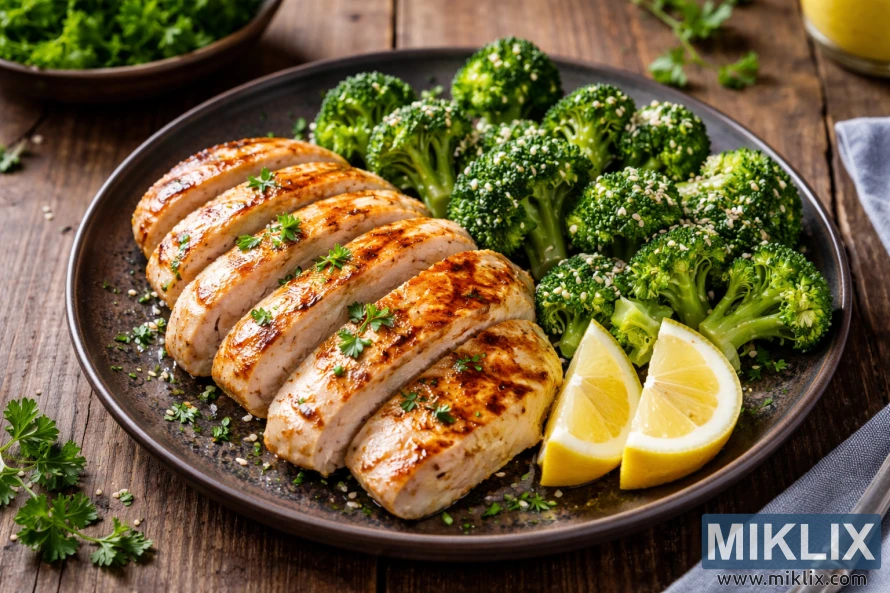
Key Takeaways
- Chicken is a popular and healthy source of protein.
- It plays a significant role in the American diet.
- Rich in essential nutrients that support overall health.
- Provides various health benefits beyond basic nutrition.
- Includes delicious ways to prepare meals for a balanced diet.
Introduction to Chicken in the American Diet
Chicken is a big deal in the American diet, being the most eaten meat in the country. Its popularity has grown a lot over sixty years. Now, the average American eats about 100 pounds of chicken every year.
Chicken is easy to find and affordable, making it popular with families and individuals. It can be prepared in many ways, like grilling, baking, frying, or slow cooking. Knowing how to cook chicken can help make meals healthier and more informed.
Nutritional Profile of Chicken
Chicken is a great source of important nutrients, adding a lot to our diet. A 3-ounce serving of skinless chicken breast has about 122 calories. This makes it a good choice for those watching their calorie intake.
It also has 24 grams of protein and only 3 grams of fat. This supports muscle growth and overall health.
Chicken is not just about protein. It's also packed with vitamins and minerals that help us stay healthy. It has B vitamins like B6 and B12, which help our bodies make energy and keep our brains working well.
It also has minerals like selenium and phosphorus. These add to chicken's nutritional value.
Knowing what's in chicken helps us make better food choices. Adding chicken to our meals can give us the nutrients we need for a balanced diet.
Health Benefits of Eating Chicken
Chicken is a favorite for many because of its health perks. It's packed with protein, which helps build and fix muscles. This meat also has amino acids that boost bone strength, great for people of all ages.
Eating chicken can help you feel full longer. This is good for keeping your weight in check. Plus, chicken has few calories, making it easy to eat healthy without feeling deprived.
Chicken is also good for your overall health. It's easy to cook in many ways, so you can always find a tasty option. With all its nutrients, chicken is a key part of a healthy diet.
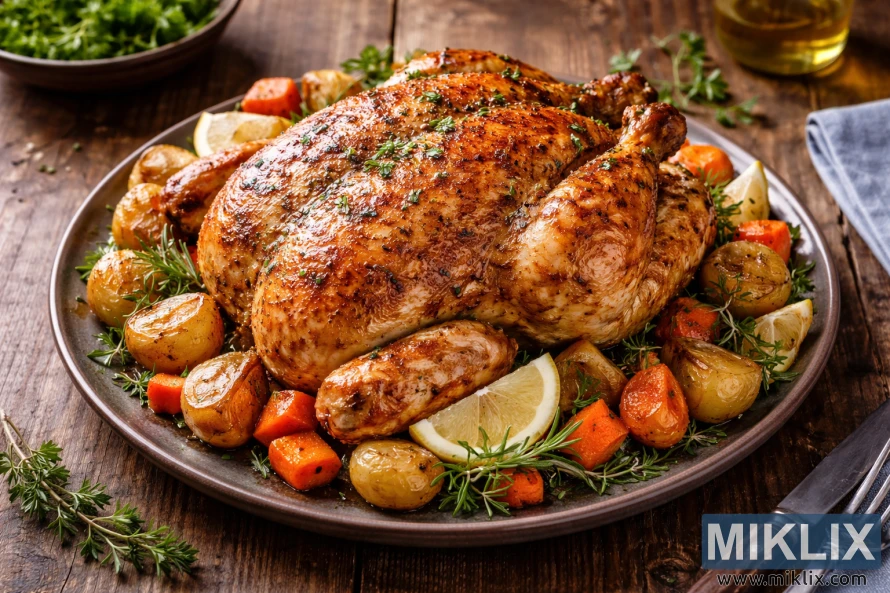
The Role of Chicken in Weight Loss
Chicken is great for weight loss because it's full of protein. Eating protein-rich foods makes you feel full and keeps your body lean. Studies show that 25-30 grams of protein at each meal can help you feel satisfied. This is key for managing your weight.
To make chicken work for weight loss, pair it with other healthy habits. These might include:
- Regular physical activity
- Incorporating a variety of vegetables
- Choosing whole grains
Adding chicken to your meals can help you reach your weight loss goals. It's also tasty and nutritious. Combining chicken with healthy sides and balanced meals can lead to great results. This makes chicken a strong partner in your weight management journey.
Chicken as a Protein Source
Chicken is a top-notch protein source, known for its high chicken protein content. It's a lean meat that gives us essential amino acids. These are key for building and repairing muscles. Eating chicken regularly boosts our health and makes our diets better.
A diet rich in protein is vital for recovery and keeping our immune system strong. This is true for anyone who's active. Adding chicken to our meals helps us get more protein without adding too many calories.
- High-quality protein: Chicken has all the amino acids we need for muscle growth.
- Low in fat: Without the skin, chicken is great for those watching their calorie intake.
- Versatile: Chicken fits into many dishes, making it easy to add to our meals.
Eating chicken as part of a balanced diet boosts our energy. It also supports an active lifestyle.
Cooking Methods: Healthier Ways to Prepare Chicken
How you cook chicken matters a lot for its health benefits. Choosing healthy cooking methods can greatly improve nutritional value. Grilling and baking are top choices, as they let chicken's natural flavors shine without adding too much fat.
Grilling gives chicken a smoky taste and keeps it moist, making it tender and juicy. It's a tasty option that needs little to no oil, cutting down on calories. Baking is easy, letting chicken cook evenly without constant checking.
Other healthy ways to cook chicken include:
- Stir-frying with just a little oil
- Poaching in broth or water
- Roasting with veggies
Using these methods can encourage healthier eating. It helps people enjoy chicken while keeping their meals nutritious. By learning and using these cooking techniques, chicken fans can savor their favorite protein in a healthy way.
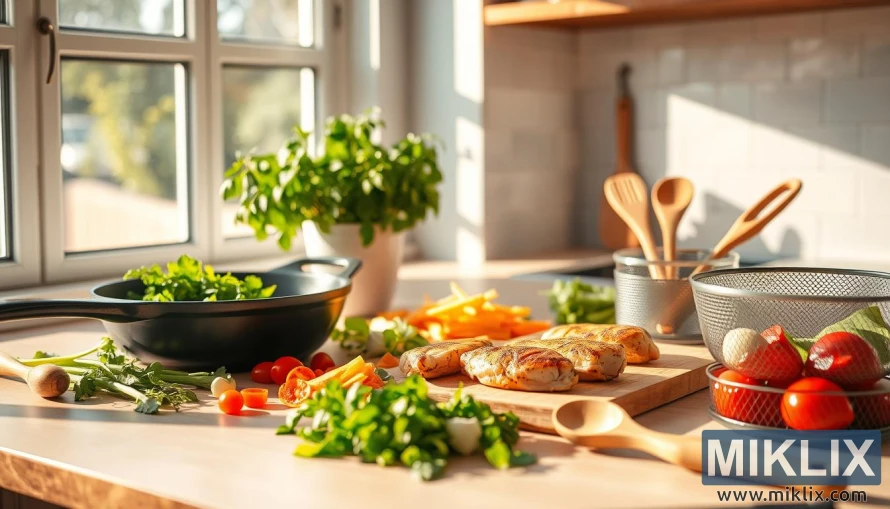
Risks of Eating Processed Chicken
Processed chicken products, like frozen chicken tenders and nuggets, pose health risks. They are often high in unhealthy fats and preservatives. These can harm your health.
These foods also have a lot of sodium. Too much sodium can raise your blood pressure and lead to heart problems.
Studies show eating processed chicken can increase the risk of heart disease, type II diabetes, and some cancers. It's important to know the risks of these foods.
To eat healthier, cut down on processed chicken. Choose unprocessed chicken instead. This reduces exposure to harmful substances.
Focus on fresh, whole foods in your diet. This helps avoid the dangers of processed chicken.
Proper Storage and Handling of Chicken
Keeping chicken safe is key to avoiding foodborne illness. After buying chicken, put it in the fridge quickly, within two hours. This keeps the meat fresh and safe to eat.
Thawing chicken right is important to stop bacteria growth. Safe ways include:
- Thawing chicken in the refrigerator
- Using cold water baths
- Avoiding countertop thawing
Cooking chicken to 165°F is vital for safety. This temperature kills harmful bacteria. By following these tips, you keep your meat fresh and safe, preventing illness.
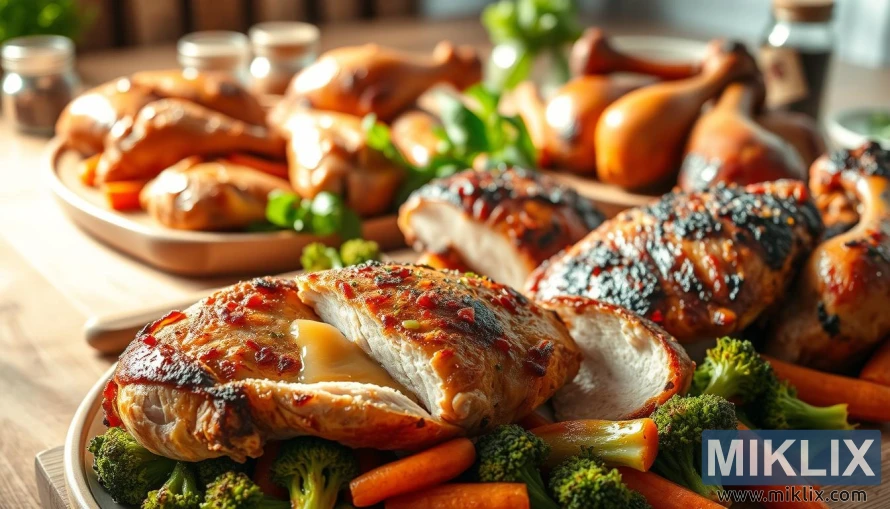
How Chicken Contributes to Heart Health
Chicken is great for your heart health. Opt for lean cuts without skin for a healthy diet. These choices improve your lipid profiles, which are key for heart function.
Eating chicken regularly can boost your heart health. It provides essential nutrients that support overall well-being. This makes chicken a fantastic addition to your meals.
A diet rich in healthy protein, like chicken, can lower heart disease risks. High triglycerides and blood pressure are common heart problems. Choosing chicken as your main protein source can lead to a healthier lifestyle.
Protein and Bone Health: The Connection
Protein and bone health are closely linked, which is key for keeping bones strong as we age. Chicken is a top-notch protein source. It helps with calcium use and keeps bones dense.
Studies show eating more protein, like from chicken, can cut down on osteoporosis and fractures. This is a big plus for older adults, who face more bone health challenges. Protein is vital for keeping bones strong and preventing them from weakening.
To boost your protein intake, make chicken a staple in your meals. Here are simple ways to add more chicken to your diet:
- Grill or bake chicken for a healthy protein-packed dinner.
- Add diced chicken to salads for added flavor and nutrients.
- Use shredded chicken in wraps or sandwiches for a satisfying lunch option.
Limitations and Considerations in Chicken Consumption
Chicken is good for you, but there are things to keep in mind. Eating chicken in a balanced way is key to staying healthy. Choose lean cuts like chicken breast for fewer calories and less fat.
It's also important to think about chicken's cholesterol. If you have dietary restrictions or health issues related to cholesterol, watch your chicken intake. Controlling your portions helps keep your diet balanced.
Talking to a healthcare professional can help. They can give advice that fits your specific needs. This ensures chicken fits into a healthy, varied diet.
Alternative Sources of Protein
Chicken is a favorite protein, but there are many other options. These alternatives offer important nutrients and fit different diets. They add variety to our meals with new tastes and textures.
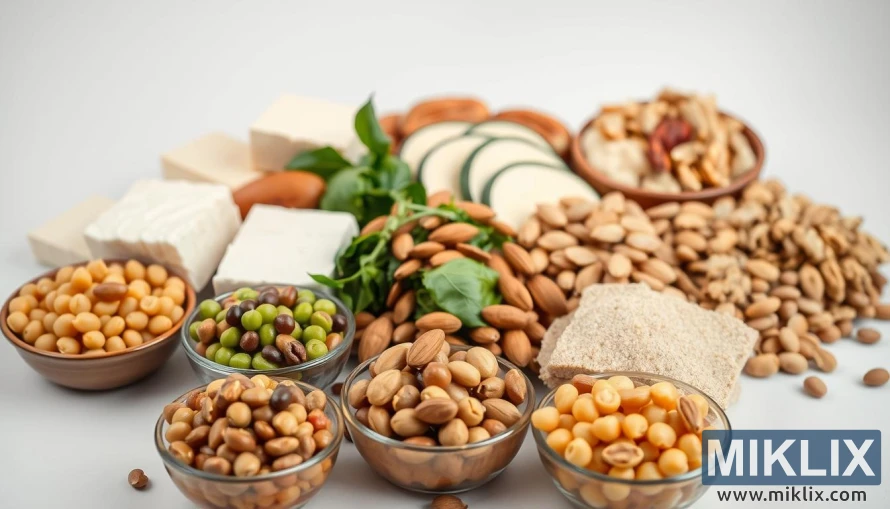
Some top non-meat protein sources are:
- Fish and seafood: They're full of omega-3s and lean protein.
- Legumes: Beans, lentils, and peas have lots of protein and fiber.
- Nuts and seeds: Almonds, chia seeds, and hemp seeds give healthy fats and protein.
- Dairy products: Milk, cheese, and yogurt are good for those who eat animal products.
- Plant-based proteins: Tofu, tempeh, and seitan are great for vegetarians and vegans.
Adding these protein alternatives to our meals makes them more interesting. It also helps us meet our nutritional needs. Learning about non-meat protein sources can lead to a healthier diet.
Chicken in a Balanced Diet
Adding chicken to your meals can boost your health. It's a great source of protein that fits into many diets. Pairing chicken with veggies, whole grains, and fruits makes meals both filling and healthy.
The Dietary Guidelines for Americans stress the need for lean meats like chicken. A balanced diet means eating a variety of foods for essential nutrients. This approach helps keep you healthy for a long time.
It's important to cook chicken in healthy ways. Planning meals with chicken and healthy sides can help you eat better. This way, you can live a healthier, more energetic life.
Conclusion
Chicken is a versatile and nutritious food that offers many health benefits. It's packed with protein, vitamins, and minerals that support our health. Adding chicken to our diet can lead to better choices and improve our overall well-being.
It's important to cook chicken in healthier ways and know the risks of processed chicken. This way, we can enjoy its benefits without harming our health. Also, knowing how to store and handle chicken makes it safer and better to eat.
Learning about chicken's health benefits helps us make better food choices. Including it in a balanced diet can greatly improve our health. This makes for a healthier lifestyle for all of us.
Further Reading
If you enjoyed this post, you may also like these suggestions:
- Natural Chill Pill: Why Tryptophan Supplements Are Gaining Traction for Stress Relief
- The Amino Acid Advantage: L-Arginine’s Role in Circulation, Immunity, and Endurance
- Grain Gains: How Oats Boost Your Body and Mind
